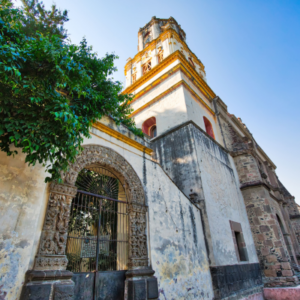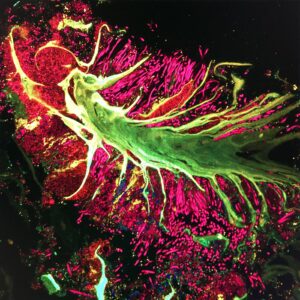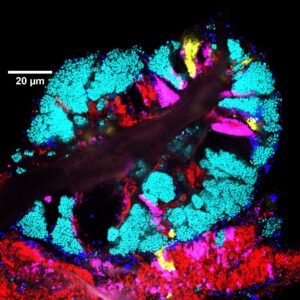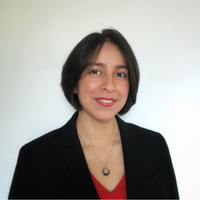Dr. Tabita Ramirez-Puebla is a staff scientist at The Forsyth Institute working in the oral microbiology program. We were fortunate to talk with Dr. Ramirez-Puebla and hear about her experiences taking up a career in STEM. As a Latina woman, she offers a valuable perspective that is not always heard in the STEM field. Dr. Ramirez-Puebla walked us through her first encounters with science all the way to her goals for changing future science environments.
Q&A with Dr. Ramirez-Puebla
Where are you from?
I’m from Mexico City in Mexico. My hometown is Coyoacán which is a town in the south of the city. It’s very green and pretty. I grew up there until I moved to Cuernavaca to do my PhD. Cuernavaca is a city in another state southeast of Mexico City.
What brought you to Boston/Forsyth?
Imaging. I met Jessica Mark Welch at a conference where she gave a talk, and I immediately became fascinated with the imaging she was doing to explore the oral microbiome. I contacted her, asking if I could join her group and, luckily, she accepted me. My work was about the spatial structure of the microbiome in marine organisms at the Marine Biological Laboratory. After finishing the initial project with Jessica there was an opportunity to move to Forsyth to work with Gary Borisy on a project studying the spatial structure of the oral microbiome and it was a great way to continue doing imaging.


Walk me through your decision to pursue a career in STEM. How did it start?
I think it started when I was a child. I was the boring cousin who sat watching documentaries and, you know, reading books. I was interested in nature and science. When I grew up, I just felt that it was natural for me to pursue a career in sciences. So, I studied biology.
Why is diversity in the sciences important to you?
This is an important question. Diversity is important because nature likes diversity. I think diversity is important in science because if you have all these different people working on a problem, then you have many more options to solve it. You know, we all have different backgrounds, different ideas, we all have something to bring to the table. It’s difficult to improve and change things if everyone has the same mindset.
Have you experienced any challenges as a Latina in STEM?
Yes. I think the most challenging thing is representation. In Mexico, I met many Latina PIs or group leaders, because we all are Latinas. In the United States though, I haven’t seen that many Latinas in positions of power. It is not that there are no Latinas here. I mean there is a big Latinx population, so you would expect better representation in these positions.
The other thing is the internalized paradigms in society. We think that things work in a certain way, because we have seen that all the time, right? And we also have all these stereotypes that Latinas are certain way, for instance, the spicy Latina or this very emotional or uneducated woman. People expect you to behave that way just because of your skin color or your accent and this impacts how you perceive yourself. We often don’t question if something could be different or why it is not different.
People also expect you to have certain types of jobs. I have heard from Latina friends that when they say “I work at Harvard,” or “I work at MIT,” people automatically assume they have a job in cleaning services or something like that because they don’t expect to see Latinas in research or leadership positions.
We need to ask ourselves, when we see people of a certain phenotype, or if we hear a person that has a certain accent, are we willing to listen to their perspectives? Are we willing to respect them as a leader, or a person that has expertise in something? Sometimes I do wonder if others see me as a person they can respect because, in general, I don’t see many Latina women as PIs. I don’t see PIs like me.
Who are your role models in the Sciences?
I think my first role model was my biology teacher in high school. She was great. I loved her and her class. She was my tutor. She helped me figure out what career I wanted to pursue. I liked biology, but because of her I liked it even more so.
Another role model was my PhD mentor, Esperanza Martinez. She’s one of the most passionate scientists I have ever met. In 2020, she received the L’Oreal UNESCO for Women in Science International Award in Latin America. She’s a pioneer in the research on how to use bacteria to reduce the impact of chemical fertilizers in Mexico. And she is a very kind, and positive person. I think she’s a role model for me because she was super supportive of my career when I was in her lab.
Not only my PhD mentor, but Jessica as well. She’s brilliant and very inspiring because I feel that she never makes assumptions of anything, instead focuses on what is actually true. She’s always listening carefully and it’s easy to talk to her. She’s always generous with her time and with her ideas.
Another person that is also inspiring and very important is my mom because, you know, my mom wanted to be a medic, but because of her socio-economic circumstances, she couldn’t pursue her dream. So, she always encouraged me and my siblings to work hard to become whatever we wanted to become and to do whatever we wanted to do. She has been very important to my development as a scientist.
I am fortunate to have these women as role models.
Gary is another person I look up to. He’s a great scientist; he has a sharp mind and approaches science with rigor and logic. Every talk with him is an opportunity to learn something new.

What advice would you give to Latina women starting their careers in STEM?
I think I would encourage them to question all the paradigms, to question why our society is structured the way it is. They should ask themselves, “Why do I have to follow these rules?” That is an easy thing to say. But it’s not easy to question social norms. It is difficult for me to speak up to question authority or to say something that could be uncomfortable for other people, particularly people in power. But it is important. I think I would encourage Latina women to believe in themselves. It’s difficult to do this as well because of all the messages and stereotypes that we are constantly receiving, but hopefully we will change that to be more and better represented.
Imagine yourself as a PI further in your career, how will your current/past experiences help you to be a leader later?
I was fortunate that I was encouraged by my family, my PhD mentor and later on my husband to pursue a career in sciences. I would like to do the same for other women and students, to make them feel that they deserve to be here and that they are capable of doing this work. But I don’t want to wait until I am a PI to do that, and I don’t think anyone should wait. There are things we can change, in any position we have, to be inclusive and encourage others who might not have had the same privileges we had. Personally, it wasn’t that easy for me to become a scientist because I’m the first person pursuing a career in STEM in my whole family. I feel fortunate to have people around to help me and encourage me, so I want to do the same for others, too. I think that’s part of being a good leader.

